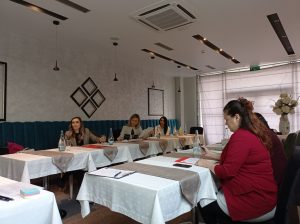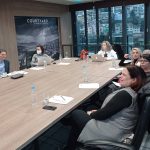The first steps towards more inclusive psychosocial support for LGBTI people in Mostar have been taken
 Two one-day trainings on LGBTI inclusive psychosocial support and mental health services were held in Mostar on May 19 and 20 as part of the European Union-funded project “Regionalising LGBTI Inclusive Psychosocial Support and Access to Mental Health Services in Bosnia and Herzegovina,” hosted by the Sarajevo Open Centre. The trainings were attended by employees of the Centre for Psychological Support “Sensus” and the Mostar Mental Health Centre.
Two one-day trainings on LGBTI inclusive psychosocial support and mental health services were held in Mostar on May 19 and 20 as part of the European Union-funded project “Regionalising LGBTI Inclusive Psychosocial Support and Access to Mental Health Services in Bosnia and Herzegovina,” hosted by the Sarajevo Open Centre. The trainings were attended by employees of the Centre for Psychological Support “Sensus” and the Mostar Mental Health Centre.
Darko Pandurević from the Sarajevo Open Centre lectured on the topic of human rights of LGBTI people, LGBTI identity, discrimination and equality. During his presentation, he discussed certain identity determinants across the LGBTI spectrum, as well as the basic challenges of being a lesbian, gay man, bisexual, trans or intersex person, as well as challenges in the field of human rights and discrimination in various social spheres. Darko also discussed activism in public space and the LGBTI movement in BiH.
The Sarajevo Open Centre’s project partner is the Wings of Hope Foundation from Sarajevo, which works to improve social inclusion and strengthen women, children, youth, and other vulnerable groups through its mental health protection program, by promoting and protecting human rights, mental health, and educational support.
Psychologists/Gestalt psychotherapists Zvjezdana Jakić and Marija Šarić, also the director of the Wings of Hope Foundation, were lecturers in the second part of the training, where they discussed how to approach LGBTI people in providing psychological support and counselling, problems and needs of LGBTI people and their family members, as well as work with parents.
The conclusions reached during this segment of the lecture are that the LGBTI community faces the same difficulties as society as a whole, but there are also additional issues related to sexual orientation and gender identity, and that psychological violence is the most difficult to prove, deal with, or fight.
Some of the guidelines for inclusive psychosocial support provided by Zvjezdana and Marija are the following:
- work on the practical inclusion of LGBTI people in personal life and community
- raising awareness of psychologists’/psychotherapists’ personal prejudices
- involve family and friends
- strengthen the role of the media and educational institutions
- connect with organizations that provide support, activism, creative activities/performances
Mateo Čovčić, a peer counsellor and psychologist at the Sarajevo Open Centre, shared his experiences about the difficulties LGBTI people face. He emphasized the role of minority stress generated by social stress, and discussed why LGBTI people seek peer counselling.
The project “Regionalising LGBTI inclusive psychosocial support and access to mental health services in Bosnia and Herzegovina” aims to create an environment in which LGBTI people are encouraged and supported to access social protection and mental health systems that offer inclusive and sensitized services. It is required to increase the capacity of social protection and mental health institutions, as well as to expand the institutional network of psychosocial support, in order to provide LGBTI people with access to such care. It is also vital to strengthen the capacities of civil society organizations that provide this type of service, as well as to train their employees on LGBTI topics.
Similar trainings are planned to be held in Zenica, Banja Luka, and Tuzla later this year.
For more information about the project, please contact:
Delila Hasanbegović Vukas, Programme Coordinator, Sarajevo Open Centre
Tel: 033 551 000
E-mail: [email protected]
 With the Support of the European Union Towards Quality Inclusive Psycho-social Support for LGBTI Persons in Mostar
With the Support of the European Union Towards Quality Inclusive Psycho-social Support for LGBTI Persons in Mostar European Union support for inclusive psychosocial support for LGBTIQ people in BiH
European Union support for inclusive psychosocial support for LGBTIQ people in BiH